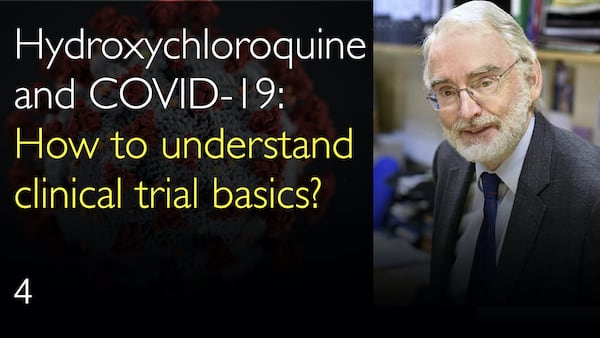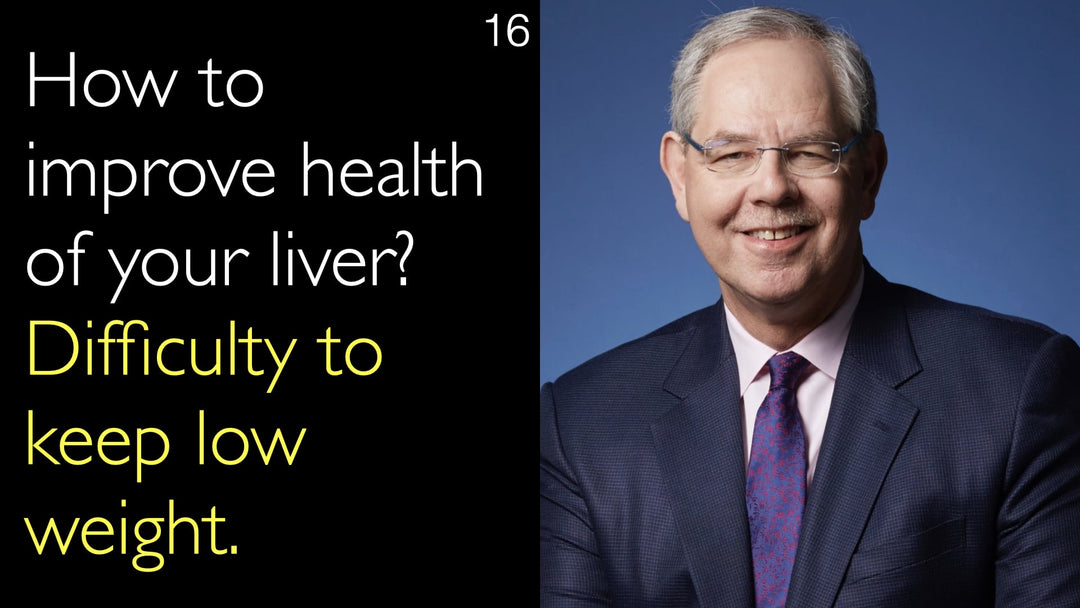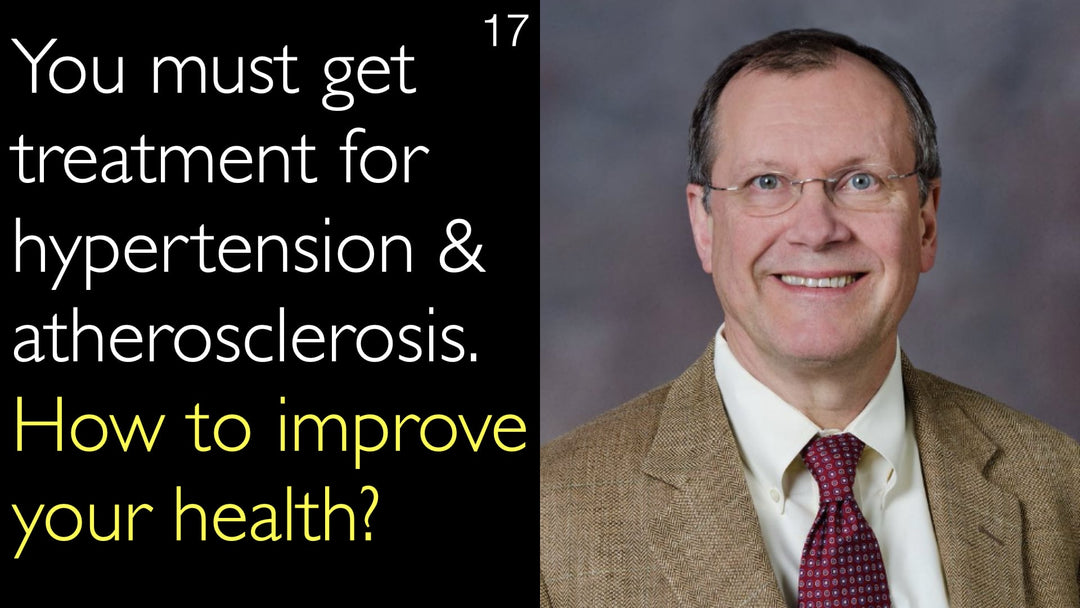Leading expert in drug trial analysis and pharmacovigilance, Dr. Stephen Evans, MD, explains how to evaluate hydroxychloroquine for COVID-19. He details the critical differences between small studies and large randomized trials. Dr. Stephen Evans, MD, discusses the inherent biases in observational research. He highlights the known cardiac risks associated with hydroxychloroquine. The risk-benefit equation is fundamentally different for treating a disease versus preventing one in healthy individuals. Current evidence does not support hydroxychloroquine's use for COVID-19 prevention or treatment.
Hydroxychloroquine for COVID-19: Evaluating the Evidence and Clinical Trial Data
Jump To Section
- Problems with Small Clinical Studies
- Observational Study Limitations and Bias
- Hydroxychloroquine Cardiac Risks and Adverse Effects
- Risk-Benefit Analysis in Healthy Patients
- Current Evidence for COVID-19 Prevention and Treatment
- Ongoing Large Randomized Clinical Trials
- Full Transcript
Problems with Small Clinical Studies
Dr. Stephen Evans, MD, cautions against relying on very small studies for hydroxychloroquine and COVID-19. He explains that random variation can cause dramatic but misleading results. A small study might show dramatic benefit or dramatic harm simply by chance. This is a fundamental principle of clinical trial interpretation. Consequently, small studies should not be used to make definitive treatment decisions.
Observational Study Limitations and Bias
Dr. Stephen Evans, MD, details the significant challenges of observational studies. These studies compare patients who receive a drug to those who do not. The major problem is ensuring both groups are similar. Patients given hydroxychloroquine may differ from those who are not in important ways. They might be sicker, leading to observed harms that are not caused by the drug itself. Alternatively, they might be healthier, creating a false impression of benefit. Dr. Stephen Evans, MD, emphasizes that these studies must be conducted with extraordinary care to minimize such confounding factors.
Hydroxychloroquine Cardiac Risks and Adverse Effects
The interview with Dr. Stephen Evans, MD, covers the established cardiac risks of hydroxychloroquine. He references a randomized trial in South America that compared different doses. The higher dose demonstrated adverse cardiac effects. Dr. Stephen Evans, MD, explains the mechanism: hydroxychloroquine prolongs the heart's recovery time between beats. In extreme cases, this can lead to dangerous arrhythmias, cardiac arrest, and death. This is a known risk profile for the drug, necessitating careful monitoring even in its approved uses for malaria and autoimmune diseases.
Risk-Benefit Analysis in Healthy Patients
Dr. Stephen Evans, MD, highlights a crucial distinction in pharmacotherapy. The risk-benefit calculation changes dramatically between treating a disease and preventing one. For a patient with lupus or malaria, tolerating some adverse effects is justified by the treatment's gains. However, using hydroxychloroquine for COVID-19 prevention in healthy people is different. The tolerance for any adverse effect is much lower. This same principle applies to vaccines, which are given to healthy populations. The equation for a healthy individual must show a clear, significant benefit to outweigh any risk.
Current Evidence for COVID-19 Prevention and Treatment
Dr. Stephen Evans, MD, provides a clear summary of the current evidence landscape. The highest quality large observational studies on hydroxychloroquine have failed to show any benefit for COVID-19. There is evidence of potential harm, particularly cardiac toxicity. Therefore, the risk-benefit balance for using it in prevention "is simply not there." For treatment, no randomized trials have yet suggested any benefit for either combating the virus or alleviating its symptoms. The current position is not that hydroxychloroquine is definitively ineffective, but that there is no reliable evidence proving it is effective.
Ongoing Large Randomized Clinical Trials
Dr. Stephen Evans, MD, concludes by noting that definitive answers are still forthcoming. Several very large randomized trials are currently underway, including major efforts in the UK. These trials are testing hydroxychloroquine both alone and in combination with other treatments against a placebo. Dr. Evans anticipates that results from these rigorous studies will be available within a month or two. This data will provide the high-quality evidence needed to conclusively determine hydroxychloroquine's efficacy and safety profile for COVID-19.
Full Transcript
Dr. Anton Titov, MD: Hydroxychloroquine and COVID-19 prevention and treatment. Early reports indicated benefit, but later observational studies showed more harm. And you're an expert in the analysis of drug trials and post-marketing surveillance for adverse effects of medications. How should one look at the evidence for and against hydroxychloroquine in COVID-19 Coronavirus infection?
Dr. Stephen Evans, MD: We should be aware of any very small studies. Random variation will mean that small studies could show dramatic benefit or dramatic harm simply by chance. And so small studies should not be used.
One of the problems with observational studies is that we are never sure that those who got, let's say, hydroxychloroquine and those who didn't are the same sort of people. They may differ in a number of ways. Observational studies may show harms that are not due to a drug, but due to the patients who get those drugs.
Or they may show benefits that are due to the sort of patients that get those drugs. Or they may fail to show benefits because the patients who get the drugs are already sicker than those who don't get the drugs.
So observational studies have to be conducted extraordinarily carefully. That's why I'm in business—to try and make sure that when we do observational studies, we do them very carefully. But at the end of the day, we're often rather uncertain.
I would look for the very best quality large observational studies on hydroxychloroquine. And so far, all of these studies have failed to show any benefit for hydroxychloroquine in COVID-19.
There has been a small randomized trial in South America. And there they were comparing not hydroxychloroquine to no hydroxychloroquine—they were comparing two different doses. The higher dose hydroxychloroquine was shown to have adverse cardiac effects that you might expect; it is a drug that we know can affect the heart beating.
Every time your heart beats, it needs to recover, and it takes a certain time to recover. Hydroxychloroquine is one of those drugs that tends to make your heart require a longer time to recover. In the extreme, this can lead to an arrhythmia of the heart and, in some instances, cardiac arrest and death.
So hydroxychloroquine is a drug that cannot be said to have no adverse effects and needs to be monitored carefully. It is effective in malaria, though in many places there has been resistance to it, so it is no longer used. But in malaria, it's effective. And in some autoimmune diseases, it's effective.
But in those cases, people already have a disease that you are treating. And so you can tolerate the adverse effects for the gains you have in the treatment. When it comes to using hydroxychloroquine to prevent COVID-19, you have to be much more careful.
Because you're treating people who are healthy, you don't want to bring any adverse effects to them. We'll come to that in a minute or two; you have the same problem with vaccines. On the whole, you don't give vaccines to people who are unwell—you give them to healthy people.
Whereas if you're already unwell, you will pay a little bit more in terms of adverse effects to get rid of your disease. But if you're healthy, that's a very different kind of equation to deal with.
So the evidence against hydroxychloroquine is not particularly strong. It's a drug that we use regularly in patients who have diseases, but we don't want to use it in patients who don't have diseases. So there is evidence for its harmfulness, and in COVID-19 we don't yet have evidence for its benefit.
The risk and benefit balance for it in prevention is simply not there. Similarly, regarding treatment, we haven't had any randomized trials that suggest that treatment with hydroxychloroquine or chloroquine sulfate—and all the forms of the same drug essentially—has any benefit at all in treating either the virus itself or the symptoms that follow from the virus.
We do not know—it's still possible because we've got some very large trials running, including some very big ones in the UK, in which hydroxychloroquine is being tested paired with other treatments and also with placebo. Within a month or two, I would expect us to have results that show whether it is effective.
We cannot say it is not effective. We simply can say that we do not have evidence that it is effective.







